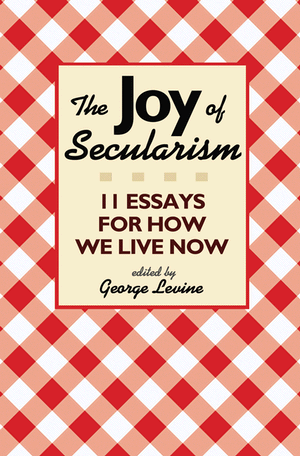The Joy of Secularism (book ed by George Levine)
|
|
This post was updated on .
 The Joy of Secularism: 11 Essays for How We Live Now Edited by George Levine 2011 http://press.princeton.edu/titles/9433.html Can secularism offer us moral, aesthetic, and spiritual satisfaction? ...The Joy of Secularism provides a balanced and thoughtful approach for understanding an enlightened, sympathetic, and relevant secularism for our lives today. ...this book shows that secularism is not a mere denial of religion. Rather, this positive and necessary condition presents a vision of a natural and difficult world--without miracles or supernatural interventions--that is far richer and more satisfying than the religious one beyond. ... From various perspectives--philosophy, evolutionary biology, primate study, Darwinian thinking, poetry, and even bird-watching--the essays in this collection examine the wealth of possibilities that secularism offers for achieving a condition of fullness. ...focusing attention on aspects of ordinary life normally associated with religion, such as the desire for meaning, justice, spirituality, and wonder. Demonstrating that a world of secular enchantment is a place worth living in... Alex's comment: Sounds like Religious Naturalism, or Religious Humanism, or Unitarian Universalism to me. |
|
|
A Critic at Large
Is That All There Is? Secularism and its discontents. by James Wood August 15, 2011 http://www.newyorker.com/arts/critics/atlarge/2011/08/15/110815crat_atlarge_wood |
|
|
I would consist this a book of non religious blah blah blah. Not worth my time to read it.
Why? Because once we get rid of religions, all sort of meanings by individuals would be formed. We don't have to live with people of religions because they would not exist any more. Before that, like it or not. Religious people are still doing horrible things, whether you like to admit to it or not. First, get rid of the bad, aka religion, and the good would come afterward. |
|
|
This post was updated on .
But that book is precisely about how secularism, after religion has gone, can positively offer meaning, wonder, morality, justice, and spirituality; in short, a satisfying full life which is worth living.
|
|
|
This post was updated on .
In reply to this post by Alex
Beyond 'New Atheism'
By GARY GUTTING, professor of philosophy, University of Notre Dame September 14, 2011 http://opinionator.blogs.nytimes.com/2011/09/14/atheism-scientific-versus-humanist ...Kitcher critically examines the spiritual experiences underlying religious belief, particularly noting that they depend on specific and contingent social and cultural conditions. Your religious beliefs typically depend on the community in which you were raised or live. The spiritual experiences of people in ancient Greece, medieval Japan or 21st-century Saudi Arabia do not lead to belief in Christianity. It seems, therefore, that religious belief very likely tracks not truth but social conditioning. ... Even more important, Kitcher takes seriously the question of whether atheism can replace the sense of meaning and purpose that believers find in religion. ...Kitcher agrees that mere liberation from theism is not enough. Atheists, he maintains, need to undertake the positive project of showing how their worldview can take over what he calls the ethical "functions" of theism. ...Kitcher has a two-part answer. First, he offers a refined extension of Plato's famous dilemma argument in "Euthyphro" to show that contrary to widespread opinion, theism is not in fact capable of grounding the ethical values that make life worthwhile. Second, to show that secularism is capable of grounding these values, he offers a sophisticated account of how ethics could have evolved as a "social technology" — a set of optimally designed practices and norms — to satisfy basic human desires. ...secular humanists would still face the much greater practical task of embedding their convictions in secular versions of the religious institutions, rituals and customs that even today remain vital fixtures in our social world. Alex's comment: "...secular humanists...practical task of embedding their convictions in secular versions of the religious institutions, rituals and customs..." The answer is Unitarian Universalism. Humanism plus "institutions, rituals, and customs" equals Religious Humanism. And Unitarian Universalism is more or less an inclusive religious community consisting of mostly Religious Humanists. |
|
|
Atheism challenges personal spiritual experiences
http://hinessight.blogs.com/church_of_the_churchless/2011/09/atheism-challenges-personal-spiritual-experiences.html |
«
Return to Atheism, Humanism, Naturalism 無神論、人文主義、自然主義
|
1 view|%1 views
| Free forum by Nabble | Edit this page |

